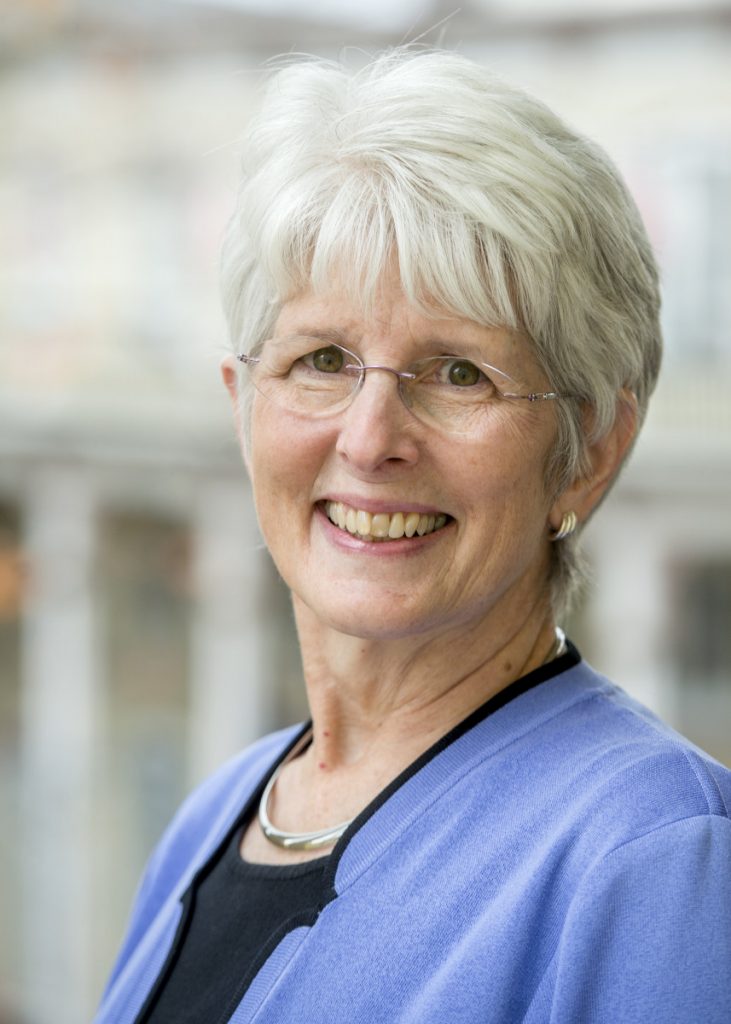DEBORAH TREFTS – STAFF WRITER

When it comes to leadership, the scholarship studying it is considerable, and the types are numerous. There are leadership approaches, behaviors, frameworks, methods, skills, styles, sets of styles and theories.
Adaptive leadership, which integrates a practical approach with a leadership framework, may be particularly relevant now. According to Candace Littell Maxwell, who has served as the chair of the Chautauqua Institution Board of Trustees since May 2019, it is meaningful not only to leaders, but also “to anyone in times of change and challenge.”
At 9:15 a.m. on Tuesday, July 20 in the tent on the front lawn of the Chautauqua Women’s Club, Maxwell will explain what it means during a talk titled “Adaptive Leadership in a Post-COVID Era,” and illustrate how it has influenced what has been happening on the grounds at Chautauqua.
“I have been aware of the concept of adaptive leadership for several years now,” Maxwell said. “It’s not new. There was a 2009 book by Harvard professor Ronald Heifetz that just really resonated with me in terms of trying to understand when the problem is really unclear and the solution is not known.”
The Practice of Adaptive Leadership: Tools and Tactics for Changing Your Organization is a sequel to Leadership on the Line: Staying Alive Through the Dangers of Leading, a book that Heifetz — founding director of the Center for Public Leadership — co-authored with Marty Linsky in 2002.
“It’s a set of qualities,” Maxwell continued. “… I’ve relied on this concept in my own career, particularly with my own consulting. Companies bring a consultant in because they don’t know the answers, and even the problems. … When COVID hit, I was deeply involved with the Institution. We didn’t know the answers.”
For over 30 years, Maxwell had also been deeply involved in health care financing, policy, strategy and advocacy.
Having grown up in Providence, Rhode Island, she said that she initially took science courses for her major in resource development, and then “loaded up on business courses.” She subsequently earned her master of business administration, with a concentration in finance.
“I spent a good part of my career in D.C. and lived in the suburbs,” Maxwell said.
There she worked as a financial analyst for the Virginia-based not-for-profit Sentara Healthcare, and as a management consultant for public accounting firm Ernst & Young.
“One of my first jobs was at the Medicare Payment Advisory Commission,” Maxwell said. In her role as senior health policy analyst, she focused on Medicare program reform.
MedPAC is an independent, non-partisan advisory agency of the U.S. Congress that was established by the Balanced Budget Act of 1997 and formed by the merger of two existing commissions.
“At a very high level I was trying to solve problems with respect to health care policy and Medicare,” Maxwell said — in particular, those involving access to high quality care, facilities for care, and the manner of health care delivery.
Having worked directly with medical manufacturers, she said she turned to medical technology.
As vice president of payment and policy for the Advanced Medical Technology Association — a Washington, D.C.-based trade group representing medical device and diagnostic product developers — Maxwell led AdvaMed’s work on public and private healthcare financing and insurance reform.
And at the privately funded Health Care Technology Institute, which supports research on the medical technology industry’s clinical and economic impact, she served as executive director and principal spokesperson for policymakers and the media.
In 1995, she formed and became president of Littell Group, a consultancy that specialized in strategic planning for medical product and technology firms until 2008. For start-ups and Fortune 500 companies alike, she assessed market opportunities for new products and ventures, particularly with respect to public and private reimbursement.
Afterwards, Maxwell co-founded and served as the managing director of a business intelligence and policy advisory consultancy for health care organizations: Contenthealth.
“I helped companies plan and execute strategies so that when they launched products, the users would be adequately compensated,” she said. “… I ensured not only that regulatory — FDA — barriers were overcome, but also barriers to the medical technology. And more broadly, (I helped them) understand the impact of medical technology on the health care system, economy, patients, caregivers and innovation in care.”
From 1999 to 2008 — when Philips Healthcare acquired Respironics — Maxwell served as a member of the company’s board of directors and the chair of its corporate governance committee. Headquartered near Pittsburgh, Respironics is a publicly traded global medical supply company specializing in products that improve sleep and respiratory functions, including anesthesia masks and the first CPAP machine for the treatment of sleep apnea.
She has also served on the boards of nonprofit organizations that provide health care for uninsured populations.
“Oftentimes we’re dealing with situations where you don’t even know if you know the problem, and there is no solution, so people are coming to you for that,” Maxwell said.
After moving from greater Washington, D.C. to Erie, Pennsylvania, she taught a course at the Jefferson Educational Society of Erie during the spring of 2012 titled “Can Health Care Reform Survive the Supreme Court?” JES is a regional nonprofit think tank that had been founded four years earlier “to promote civic enlightenment and drive community progress.”
Maxwell’s session focused on the oral arguments about constitutional questions raised by the Patient Protection and Affordable Care Act (“Obamacare”) that were being heard by the U.S. Supreme Court.
“The case raises important issues concerning Congressional powers, and states’ and individuals’ rights with respect to health care,” she wrote then. “This session will explore the issues and implications of possible rulings by the high court.”
Then and now, the enormous uncertainty regarding health-related challenges confronting virtually everyone in the United States and far beyond makes an introduction to adaptive leadership both important and urgent.
For Chautauquans, Maxwell’s Tuesday morning tent talk at the CWC — which is intended to be practical rather than theoretical — will provide a unique opportunity to learn how the framework of adaptive leadership is being applied by Chautauqua’s leadership and experienced on the grounds.




